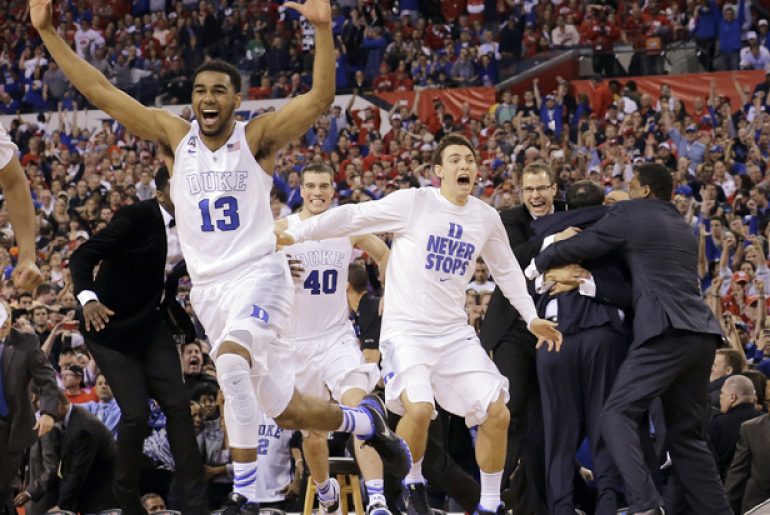[This piece originally appeared in Salon.com: http://www.salon.com/2015/04/07/march_madness_and_the_ncaa_purity_lie_how_the_billion_dollar_basketball_industrial_complex_blinds_us_to_our_biggest_flaws/]
In a nation split by partisan bickering, one of the few documents that both liberals and conservatives await with genuine enthusiasm is President Obama’s March Madness bracket. Liberals hope to match it or best it. Conservatives hope to obliterate it, but unlike most hot political topics, it’s all in good fun, right? For many, March Madness is the ultimate return and escape: a return to a simpler, purer time; an escape from the crass concerns of corrupt professional sports. This perception is, of course, rooted in myth. This year’s March Madness tournament will earn the NCAA close to a billion dollars in revenue. TV ratings for CBS, who aired the tournament games, skyrocketed to an 18-year high. That this tangled mess of contradictions and hypocrisies is cause for celebration for anyone other than the NCAA — and CBS — is a sign of both the accuracy and the timelessness of Juvenal’s old adage about bread and circus. Rather than celebrating, we should all approach March Madness with a sense of foreboding. March Madness is emblematic of so many troubling trends in business, labor, education and race that extend way beyond the basketball court.
For starters, the NCAA is a cartel that has created a monopoly, and like other cartels it argues that its goals and the public’s goals are one and the same — John D. Rockefeller argued that Standard Oil’s monopoly provided stability, and OPEC, according to its website, “organizes and unifies petroleum policies in order to stabilize oil markets”. The NCAA predictably calls itself a “membership-driven organization dedicated to safeguarding the well-being of student-athletes and equipping them with the skills to succeed on the playing field, in the classroom and throughout life.” All unassailable goals, sure, but cartels, whether they’re the NCAA or OPEC, exist to fix prices — in the case of the NCAA, it’s the price of labor.
But don’t call the basketball players workers. The NCAA reconciles the dilemma in the public’s mind by creating euphemisms that redefine both labor and laborers. It makes a point of emphasizing — ad nauseam — that the athletes participating in March Madness are “student-athletes” or amateurs, even though these so-called kids are contractually obligated to participate in press junkets, to perform consistently at a high level on the court, to wear the logos of sponsors and to submit to social media monitoring by their respective schools. If they fail in any of these duties, their athletic scholarships can be revoked — no matter how well they are performing academically. They can also be saddled with medical bills later in life from injuries sustained while they were working as student athletes, because they are not employees and thus not eligible for worker’s compensation coverage. Like many workers today, they exist in a kind of netherworld with limited rewards, but ever expanding punishments.
We see echoes of this in a number of other places, with interns doing the work of workers, temps doing the work of staffers, adjuncts doing the work of professors – but none of them reaping the benefits associated with the higher position. Others are now working in the “sharing economy,” driving for car services, assembling furniture, cooking and cleaning for an hourly rate. These are all supposed to represent opportunities for advancement, in many ways akin to those of the student athlete — the chances of making it to the pros (in other words, to a full time staff position) are increasingly slim. Labor organization is discouraged or outright forbidden. Euphemisms also transform the nature of the worker and the work itself, but usually in the employer’s favor. So, a temporary employee for amazon.com will find herself signing both the kind of limited-terms agreement that we associate with a temp worker and the kind of non-compete clause we associate with permanent employment.
The answer to this limited mobility, in the imaginations of many, is more education. But spending on education in America is at an all-time high, while social mobility is at historic lows. Testing and assessments have become synonymous with teaching in many classrooms. For-profit colleges, with little regulation and oversight, leave graduates with few marketable skills and loads of debt. The costs of traditional universities have skyrocketed, making some majors off-limits to those hoping to eventually pay off student loans. It would seem insane to celebrate this trend of education-without-learning in a national forum — but that’s exactly what celebrating March Madness implies.



